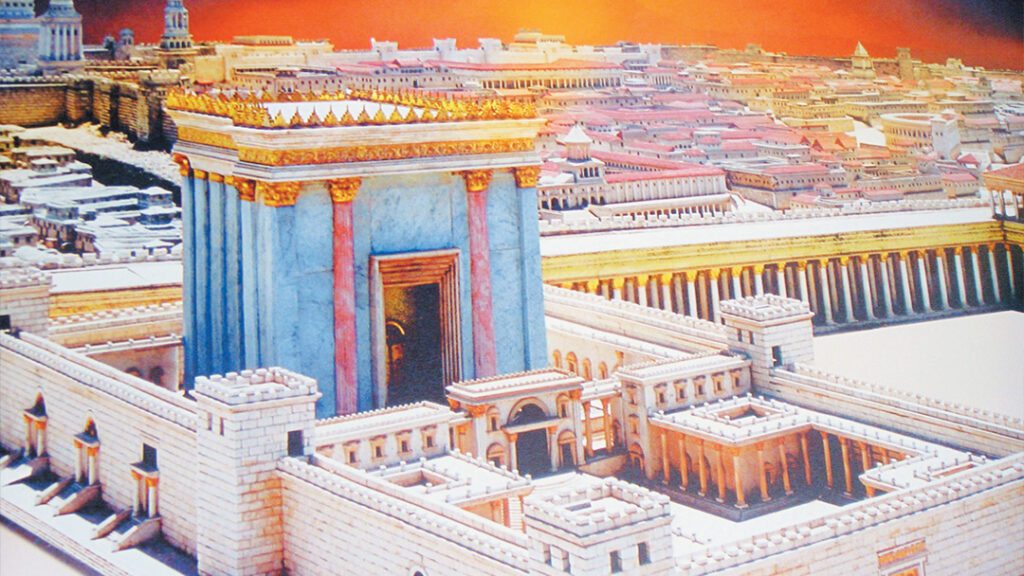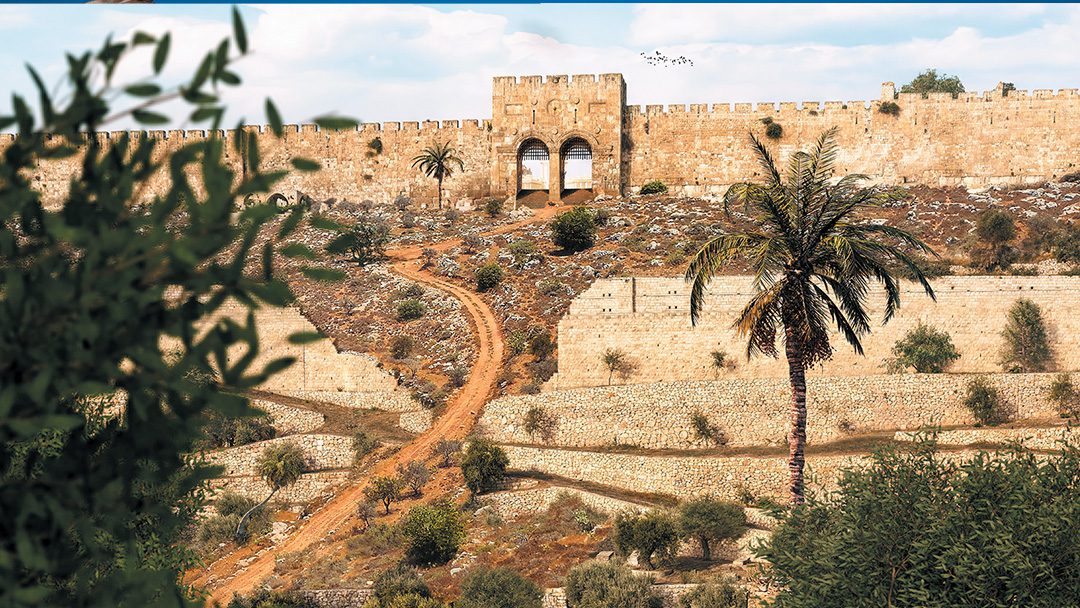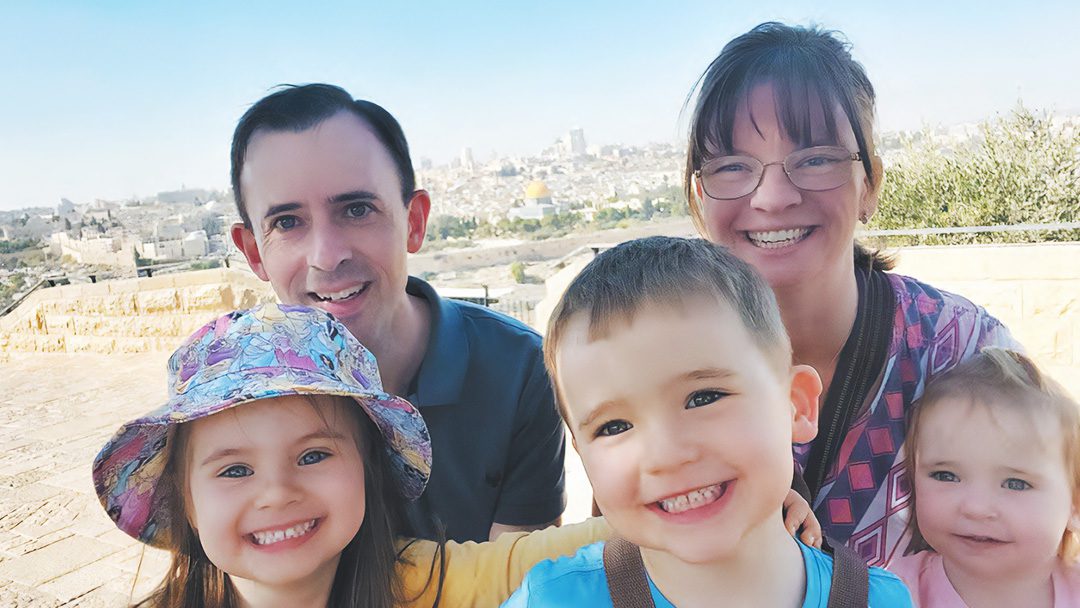Most of us are aware that there were two altars in the temple – one for sacrifice in the Court of the Priests and the altar of incense in the Holy Place. However, there was another altar that is rarely taught about in Christian circles – the altar outside the camp. It is mentioned in Hebrews 13:10 and played a significant role in the proceedings for Yom Kippur – the Day of Atonement.
We have an altar from which those who serve the tabernacle have no right to eat. For the bodies of those animals whose blood is brought into the Holy Place by the high priest as an offering for sin are burned outside the camp. Heb 13:10-11
When building the tabernacle Moses was commanded to burn the remains of the bull for consecration of the priests and on Yom Kippur outside the camp as it was a sin offering. The priests could not partake of this.
The Miphkad Altar
In the second temple period, in the time of Yeshua, there was a double arched bridge across the Kidron Valley, from the Temple precinct to the Mount of Olives where the third altar outside the camp was located (Mishnah, Para 3:6-9). The ramp/bridge was to ensure there was no contamination from any graves that may lie below in the Kidron Valley. It went from the Eastern Gate (Middoth 1:3) to the top of the Mount of Olives (a Sabbath Day’s journey or 2000 cubits) where this altar was situated and it had to be in line with the Holy of Holies. The Mishnah states: “the [High] Priest that burns the [Red] heifer and stands at the top of the Mount of Olives should be able to look directly into the entrance of the Sanctuary when the blood is sprinkled” (Middoth 2:4, see Num 35:5, Num 19:2-9). This gate through which the High Priest left came to be called the ‘Miphkad’ gate and the altar the ‘Miphkad’ altar.
Rejoice always, pray without ceasing, in everything give thanks; for this is the will of God for you in Christ Jesus.
1 Thess 5:15-18
Miphkad means ‘appointed place’, ‘muster’ or ‘inspection’. It was where the people coming to the Temple were inspected to ensure they were ritually clean. As they came, heads were counted for a census and the Temple tax collected. This Miphkad altar (or pit) was the one from which the priests could not eat (Heb 13:10), so the writer of Hebrews is here referring to this altar and the rituals performed on it.
The Red Heifer
Only the High priest could enter the Holy of Holies and only once a year on Yom Kippur. He had to first cleanse himself and atone for his own sin before bringing the sacrifice for the sins of the nation. The Red Heifer’s blood was used to cleanse the temple, the sacred vessels, the High Priest and his family, the priests and the people. The ashes of the heifer that was burned on the Miphkad altar were collected and used mixed with water to purify those who had been ritually unclean (Num 19:9,17).
In the New Covenant, the book of Hebrews tells us:
Therefore Jesus also suffered outside the gate, that He might sanctify the people through His own blood. So then, let us go out to Him outside the camp, bearing His reproach. Heb 13:12-13 Yeshua has fulfilled the blood sacrifice once and for all and we who believe in Him are now sanctified by His blood. As He was crucified outside the city walls, so we must be prepared to suffer rejection and be ostracised for our faith as He was by the religious aristocracy of His day. Our behaviour must now also be pure and holy, bringing Him glory, so our accusers can find no earthly reason to persecute us except that we do not ‘fit the mould’.

Christian Sacrifices
The writer to the Hebrews continues:
Through Him then, let’s continually offer up a sacrifice of praise to God, that is, the fruit of lips praising His name. And do not neglect doing good and sharing, for with such sacrifices God is pleased.
Heb 13:15-16 The altar for Christians is now an altar in our hearts: a thanksgiving and praise to Him. Our sacrifices must not only be in words but also in actions of sharing His message and caring for our community and more broadly the fallen world. The Jews have a wonderful philosophy of life called ‘Tikkun Olam’. It means
‘repairing the world’ and embraces fixing the brokenness of the planet and caring for people in need. Hence Jews have contributed far beyond their numbers in inventions to help us all in medicine, science, agriculture and technology to name just a few areas.
Altar of Praise & Thanksgiving
We are told God is exalted on the praises of His people.
Yet You are holy, You who are enthroned upon the praises of Israel. Ps 22:3
The Levites were to twice daily thank the Lord: They are to stand every morning to thank and to praise and we offer sacrifices of the Lord, and likewise at evening. 1 Chron 23:30
Paul exhorts us:
See that no one repays another with evil for evil, but always seek what is good for one another and for all people. Rejoice always, pray without ceasing, in everything give thanks; for this is the will of God for you in Christ Jesus. 1 Thess 5:15-18
A grateful heart opens the door for God to act and as we see the good rather than the bad that is all around us our hearts become lighter and joy comes to us in full measure. This Yom Kippur, we can rejoice that Yeshua has sacrificed His blood and become our scapegoat to take away our sin.
Bless the Lord, my soul, and all that is within me, bless His holy name. Bless the Lord, my soul, and do not forget any of His benefits; who pardons all your guilt, who heals all your diseases; who redeems your life from the pit, who crowns you with favour and compassion; who satisfies your years with good things, so that your youth is renewed like the eagle. Ps 103:1-5












Amen.